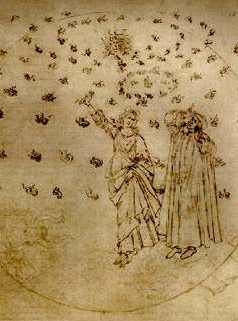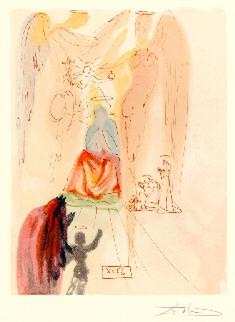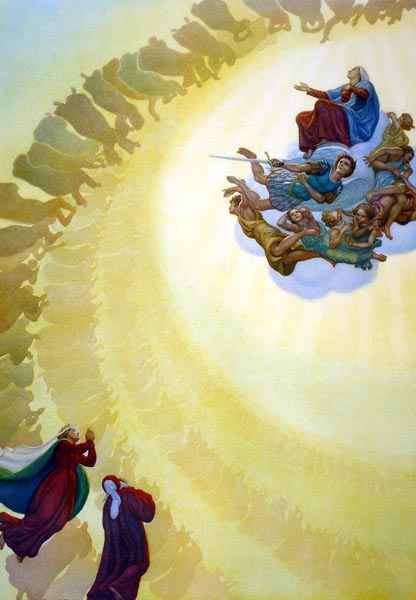 |
 |
 |
|
|
|
|
 |
 |
 |
|
|
|
|
| PAR23 |
|
|
|
|
| ........... | ....... G.GUAITA |
................................. H.W.LONGFELLOW |
...... .D.ALIGHIERI |
....... ... | ....... |
| 1
|
Mè
'l
fa
l'üzèl,
che
'ndrénta
i ràmi e i
fòji, ansèma ai so car cit puzà 'ntal nì, la nöt che 'd tüt la gàva a nuj la vìsta, |
Even
as a bird, 'mid the beloved leaves, Quiet upon the nest of her sweet brood Throughout the night, that hideth all things from us, Who, that she may
behold
their longed-for looks Anticipates the
time on open
spray |
Come
l'augello,
intra
l'amate
fronde, posato al nido de' suoi dolci nati la notte che le cose ci nasconde, |
| 4
|
par
dezidéri
'd
vëdi
i
so
car fiö e par andè pö 'n gir ciarchè 'l mangè, fadìga che lü 'l fa tant vulantéra, |
che, per
veder li
aspetti disiati e per trovar lo cibo onde li pasca, in che gravi labor li sono aggrati, |
|
| 7
|
l'è
'ncùra
scüri
e
'n
cìma
'l va a la piànta, e lì atént che 'l vén'a 'l sul la spèta vardànd fis vèrs là 'ndùa già 's fa ciàr; |
previene
il tempo
in su aperta frasca, e con ardente affetto il sole aspetta, fiso guardando pur che l'alba nasca; |
|
| 10
|
giüst
cuzì
la
mè
dòna
la
spetàva bén aténta, girà vèrs l'àut dal cél là 'ndùa zmìa 'l sul avéj mén prèsa; |
Even
thus my Lady standing was, erect And vigilant, turned round towards the zone Underneath which the sun displays less haste; So that beholding
her distraught
and wistful, But brief the
space from
one When to the other; |
così la donna
mia stava eretta e attenta, rivolta inver' la plaga sotto la quale il sol mostra men fretta: |
| 13
|
e
mi,
vdénd
lé
cun
l'ànima
suspéiza, iéra mè iün che par la vòja 'l süsta e 'ntant che spèta, 'ntla sper°nsa 's pàzia. |
sì
che, veggendola
io sospesa e vaga, fecimi qual è quei che disiando altro vorria, e sperando s'appaga. |
|
| 16
|
Ma
poc
l'è
pasà
tra
iün
e l'àut mumént, tra 'l mè spetè, i völ dì, e la s'ciarè che 'l cél la vnìva sémp pü bèl e ciàr. |
Ma poco
fu tra uno
e altro quando, del mio attender, dico, e del vedere lo ciel venir più e più rischiarando; |
|
| 19
|
"Vàrda
chi
-
Beatrìs
am
dis
- l'ezèrcit dal Crìstu triunfànt; vàrda chi 'l früt che 's cöj dal muvimént ad tüti i céj!". |
And
Beatrice exclaimed: "Behold the hosts Of Christ's triumphal march, and all the fruit Harvested by the rolling of these spheres!" It seemed to me
her face
was all aflame; As when in nights
serene
of the full moon |
e
Beatrice disse:
«Ecco le schiere del triunfo di Cristo e tutto 'l frutto ricolto del girar di queste spere!». |
| 22
|
Ma
zmiàva
che
vampéisa
'd
carità e l'àva 'nti so öc' na cuntantësa che a dì mè l'éra lé, iù nén paròli. |
Pariemi
che 'l suo
viso ardesse tutto, e li occhi avea di letizia sì pieni, che passarmen convien sanza costrutto. |
|
| 25
|
Mè
quànd
an
mès
al
cél
iè lün'a pién'a che Trìvia rid tra i tànti nìnfi etèrni che daspartüt an cél i fan ricàm, |
Quale ne'
plenilunii
sereni Trivia ride tra le ninfe etterne che dipingon lo ciel per tutti i seni, |
|
| 28
|
adzùra
di
miliòn
ad
lùci
i
vëd an sul, che tüti quànti iu viscàva, mè cun ia stéili al nos al fa 'ntal cél; |
Saw
I, above the myriads of lamps, A Sun that one and all of them enkindled, E'en as our own doth the supernal sights, And through the
living light
transparent shone O Beatrice, thou
gentle guide
and dear! |
vid'i'
sopra migliaia
di lucerne un sol che tutte quante l'accendea, come fa 'l nostro le viste superne; |
| 31
|
e
's
vidìva
da
'd
là
dla vìva lùce la lüzénta sustànsa e tàntu ciàra, che susténla la vìsta nanc pudìva. |
e per la
viva luce
trasparea la lucente sustanza tanto chiara nel viso mio, che non la sostenea. |
|
| 34
|
O
Beatrìs,
me
guìda
dùsa
e
càra! "Cul che ta scunfònd - lé 'lura 'm dis - l'è na virtü' che 'nsün ai pöl rezìsti. |
Oh
Beatrice, dolce
guida e cara! Ella mi disse: «Quel che ti sobranza è virtù da cui nulla si ripara. |
|
| 37
|
Chi
la
sapiénsa
iè
e
la
puténsa che l'ha dürvì la strà tra tèra e cél, mè che 's dezideràva da tant témp". |
There
are the wisdom and the omnipotence That oped the thoroughfares 'twixt heaven and earth, For which there erst had been so long a yearning." As fire from out
a cloud
unlocks itself, So did my mind,
among those
aliments |
Quivi
è la
sapienza e la possanza ch'aprì le strade tra 'l cielo e la terra, onde fu già sì lunga disianza». |
| 40
|
Mè
'd
na
nìvula
i
sort
fòra la lòzna parchè pü nén pöl ténsi 'ndrén ad lé, e còntra so natüra piòmba 'n tèra, |
Come foco
di nube
si diserra per dilatarsi sì che non vi cape, e fuor di sua natura in giù s'atterra, |
|
| 43
|
dès
tra
cùli
vivàndi
la
mè
mént carsüa 'd tant, a l'è surtì da lé e che la féisa là 's ricòrda nén. |
la mente
mia così,
tra quelle dape fatta più grande, di sé stessa uscìo, e che si fesse rimembrar non sape. |
|
| 46
|
"Dörv
i
öc'
e
vàrda
atént
mè che i son mi; ti dal ròbi t'è vdü che dès at pödi sustén'i la splendùr dal me surìs". |
"Open
thine eyes, and look at what I am: Thou hast beheld such things, that strong enough Hast thou become to tolerate my smile." I was as one who
still retains
the feeling When I this
invitation heard,
deserving |
«Apri li occhi
e riguarda qual son io; tu hai vedute cose, che possente se' fatto a sostener lo riso mio». |
| 49
|
Mi
iéra
tam
mè
iün
che
'l cèrca 'rpièsi di 'n sogn che l'è zmantià e che s'ingégna da fèslu riturnè ancù a la mént, |
Io era
come quei
che si risente di visione oblita e che s'ingegna indarno di ridurlasi a la mente, |
|
| 52
|
quànd
iù
santì
s'invìt
a
mi
tant car che maj pudrà scanslèsi da cul lìbar andùa 'l témp pasà l'è registrà. |
quand'io
udi' questa
proferta, degna di tanto grato, che mai non si stingue del libro che 'l preterito rassegna. |
|
| 55
|
Se
dès
parléisu
tüti
cùli
léngui ch'iàn nütrì Pulimnìa e i so surèli cun al so lat fazéndji vnì pü bèli, |
f
at this moment sounded all the tongues That Polyhymnia and her sisters made Most lubrical with their delicious milk, To aid me, to a
thousandth
of the truth And therefore,
representing
Paradise, |
Se mo
sonasser tutte
quelle lingue che Polimnia con le suore fero del latte lor dolcissimo più pingue, |
| 58
|
a
iütè
mi,
dal
vér
nànca
a 'l milézim sa vnirìa, cantànd al rìdi sant e la lùce che iàva 'ndrénta i öc'. |
per
aiutarmi, al
millesmo del vero non si verria, cantando il santo riso e quanto il santo aspetto facea mero; |
|
| 61
|
E
cuzì
prezentànd
al
paradìs, al mè puéma sant dév rinüncè mè chi 'l tròva zbarà al so camìn. |
e
così, figurando
il paradiso, convien saltar lo sacrato poema, come chi trova suo cammin riciso. |
|
| 64
|
Ma
se
iün
pénsa
a
cùla
cària gréva che l'è cariàsi an pòvar om murtàl, iè nén da dì se sut cul péis al trëma. |
But
whoso thinketh of the ponderous theme, And of the mortal shoulder laden with it, Should blame it not, if under this it tremble. It is no passage
for a little
boat "Why doth my face
so much
enamour thee, |
Ma chi
pensasse il
ponderoso tema e l'omero mortal che se ne carca, nol biasmerebbe se sott'esso trema: |
| 67
|
L'è
nén
mè
pilutè
na
cìta
bàrca truvèsi chi al timòn 'd sa nav ardìa, né 'd chi völ risparmièsi 'd fadighè. |
non
è pareggio
da picciola barca quel che fendendo va l'ardita prora, né da nocchier ch'a sé medesmo parca. |
|
| 70
|
"Parchè
la
mè
fàcia
tant
t'inamùra che nanc tat gìri vèrs al bèl giardìn che sùta i rag' ad Crìstu l'è fiurì? |
«Perché
la faccia mia sì t'innamora, che tu non ti rivolgi al bel giardino che sotto i raggi di Cristo s'infiora? |
|
| 73
|
Chi
iè
la
röza
'ndùa
al
Vèrb divìn l'è fàsi carn; chi 'l bon prufüm di liru che 'l mond a l'ha guidà 'nsla bòn'a strà". |
There
is the Rose in which the Word Divine Became incarnate; there the lilies are By whose perfume the good way was discovered." Thus Beatrice;
and I, who
to her counsels As in the
sunshine, that
unsullied streams |
Quivi
è la
rosa in che 'l verbo divino carne si fece; quivi son li gigli al cui odor si prese il buon cammino». |
| 76
|
Cuzì
Beatrìs,
e
mi
che
a
i so cunsìli bén iéra pront, ancùra iù duvü' la débula mè vìsta bütè a pròva. |
Così Beatrice;
e io, che a' suoi consigli tutto era pronto, ancora mi rendei a la battaglia de' debili cigli. |
|
| 79
|
Mè
stand
an
zòna
d'òmbra,
mi
iù vist an rag' ad sul 'd na nìvula surtì, ilüminè luntàn an prà fiurì, |
Come a
raggio di
sol che puro mei per fratta nube, già prato di fiori vider, coverti d'ombra, li occhi miei; |
|
| 82
|
cuzì
iù
vdü
n
ezèrcit
da
splendùr, vnì fulgurà da l'àut da rag' ardént, ma nén 'l prinsìpi vdìva 'd cùla lùce. |
So
troops of splendours manifold I saw Illumined from above with burning rays, Beholding not the source of the effulgence. O power benignant
that dost
so imprint them! The name of that
fair flower
I e'er invoke |
vid'io
così
più turbe di splendori, folgorate di sù da raggi ardenti, sanza veder principio di folgóri. |
| 85
|
O
fòrsa
tant
benìgna
che
tiu
imprònti, ti t'è tiràti sü par nén uféndi la mè vìsta che l'éra nén da tant. |
O benigna
vertù
che sì li 'mprenti, sù t'essaltasti, per largirmi loco a li occhi lì che non t'eran possenti. |
|
| 88
|
Al
nom
di
cul
bèl
fiùr
che sémp i invòc séra e matìn, l'è fami cuncentrà a ciarchè 'd fisè cùla inténsa lùce. |
Il nome
del bel fior
ch'io sempre invoco e mane e sera, tutto mi ristrinse l'animo ad avvisar lo maggior foco; |
|
| 91
|
E
quànd
anti
mè
öc'
l'è
rifletìsi la blësa e la grandësa 'd cùla stéila che là sü vins mè l'ha vinsì chi giü, |
And
when in both mine eyes depicted were The glory and greatness of the living star Which there excelleth, as it here excelled, Athwart the
heavens a little
torch descended Whatever melody
most sweetly
soundeth |
e come
ambo le luci
mi dipinse il quale e il quanto de la viva stella che là sù vince come qua giù vinse, |
| 94
|
da
l'aut
dal
cél
ai
càla
giü na lùce a fùrma 'd sèrc' mè füisa na curòn'a, e circundàndla, as büta girè 'nturn. |
per entro
il cielo
scese una facella, formata in cerchio a guisa di corona, e cinsela e girossi intorno ad ella. |
|
| 97
|
Qualùnque
meludìa
ià
'l
son
pü
dus, da nuj an tèra e pénetra 'ntal cör, nìvula zmiirìa squarsà dal tron, |
Qualunque
melodia più
dolce suona qua giù e più a sé l'anima tira, parrebbe nube che squarciata tona, |
|
| 100
|
paragunà
al
son
ad
cùla
lìra che 'ntur al bèl zafìr la circulàva che là 'ntal cél pü ciàr a s'inzafìra. |
Compared
unto the sounding of that lyre Wherewith was crowned the sapphire beautiful, Which gives the clearest heaven its sapphire hue. "I am Angelic
Love, that
circle round And I shall
circle, Lady
of Heaven, while |
comparata
al sonar
di quella lira onde si coronava il bel zaffiro del quale il ciel più chiaro s'inzaffira. |
| 103
|
"Mi
i
son
amùr
angélic
che
chi i gir a la deìisia 'nturn che vén dal sén che 'l früt deziderà l'ha cuncepì; |
«Io
sono amore
angelico, che giro l'alta letizia che spira del ventre che fu albergo del nostro disiro; |
|
| 106
|
e
i
girarù
fin
tant,
dòna
dal cél, che près al fiö t'andrè, e là entrànd, pü lüminùs 't farè al cél pü àut". |
e
girerommi, donna
del ciel, mentre che seguirai tuo figlio, e farai dia più la spera suprema perché lì entre». |
|
| 109
|
Cuzì
finìva
al
son
'd
cul
carijòn, che 'n gir l'andàva e tüti cùli lùci ai fàvu risunè 'd Marìa 'l nom. |
Thus
did the circulated melody Seal itself up; and all the other lights Were making to resound the name of Mary. The regal mantle
of the volumes
all Extended over us
its inner
border, |
Così la circulata
melodia si sigillava, e tutti li altri lumi facean sonare il nome di Maria. |
| 112
|
Cul
ca
l'è
'd
tüti
i
céj 'l mantèl reàl e che püsè 'l cuntén amùr e vìta dla spìrit e 'l custüm dal Creatùr, |
Lo real
manto di
tutti i volumi del mondo, che più ferve e più s'avviva ne l'alito di Dio e nei costumi, |
|
| 115
|
l'ava
dzùra
da
nuj
l'intèrna
rìva distànta ancùra tant che la parvénsa, là 'ndùa iéra mi sa vdìva nén; |
avea
sopra di noi
l'interna riva tanto distante, che la sua parvenza, là dov'io era, ancor non appariva: |
|
| 118
|
perciò
i
mè
öc'
iàn
nén
avü' puténsa da 'ndèi près la fiàma 'ncurunà che l'è 'ndà sü ansèma la so sménsa. |
Therefore
mine eyes did not possess the power Of following the incoronated flame, Which mounted upward near to its own seed. And as a little
child, that
towards its mother Each of those
gleams of whiteness
upward reached |
però non ebber
li occhi miei potenza di seguitar la coronata fiamma che si levò appresso sua semenza. |
| 121
|
Mè
che
fa
'l
matalìn
che
'nvèr la màma dòpu che 'l lat l'è pià, al dörv i bras e 'l mùsta ànche da fòra al viv afèt, |
E come
fantolin che
'nver' la mamma tende le braccia, poi che 'l latte prese, per l'animo che 'nfin di fuor s'infiamma; |
|
| 124
|
ugnün
'd
cuj
a
splendùr
cun
la so fiàma an sü sa zlungàva; cuzì l'amùr che iàvu vèrs Marìa i dimustràvu. |
ciascun
di quei candori
in sù si stese con la sua cima, sì che l'alto affetto ch'elli avieno a Maria mi fu palese. |
|
| 127
|
E
pö
ién
rastà
lì
an
mè prezénsa, 'Regìna coeli' cantànd, cuzì dusmàn che ancùra i sént andrén al gudimént. |
Thereafter
they remained there in my sight, 'Regina coeli' singing with such sweetness, That ne'er from me has the delight departed. O, what
exuberance is garnered
up There they enjoy
and live
upon the treasure |
Indi
rimaser lì
nel mio cospetto, 'Regina celi' cantando sì dolce, che mai da me non si partì 'l diletto. |
| 130
|
Che
grànda
la
richësa
là
cuntnüa an cuj tezòr tüt pién 'd felicità che tàntu bon ién stàta a samnè bén! |
Oh quanta
è
l'ubertà che si soffolce in quelle arche ricchissime che fuoro a seminar qua giù buone bobolce! |
|
| 133
|
As
viv
sü
chi
e
's
god ad cul tezòr guadagnà pianzénd làcrimi 'ntla val ad Babilòn, stacà par sémp da l'or. |
Quivi si vive
e gode del tesoro che s'acquistò piangendo ne lo essilio di Babillòn, ove si lasciò l'oro. |
|
| 136 | Chi
dla
vitòria
ad
Crìstu
fiö
di Dìu e 'd Marìa, al célebra al triònf cun cùla gént antìca e cun la növa, |
There
triumpheth, beneath the exalted Son Of God and Mary, in his victory, Both with the ancient council and the new, He who doth keep the keys of such a glory. |
Quivi triunfa,
sotto l'alto Filio di Dio e di Maria, di sua vittoria, e con l'antico e col novo concilio, |
| 139 | cul che l'ha 'n man i ciàv ad tànta glòria. | colui che tien le chiavi di tal gloria. |